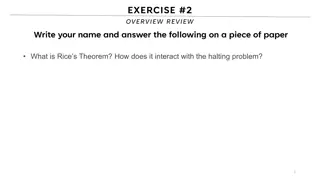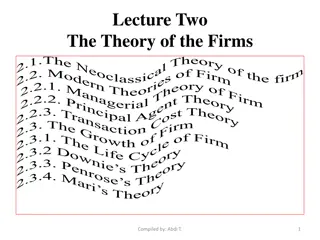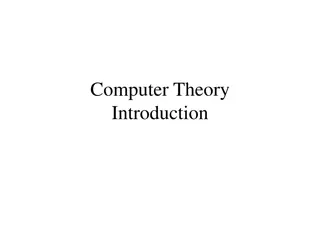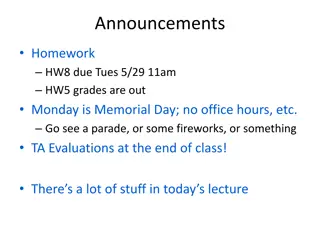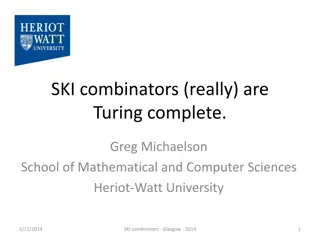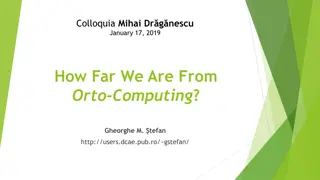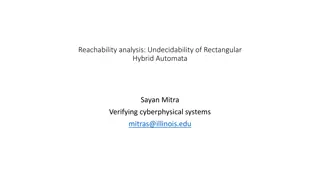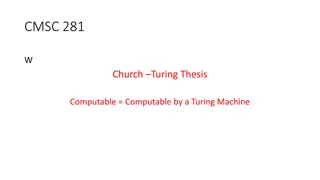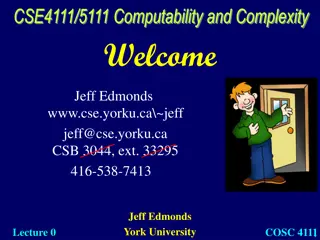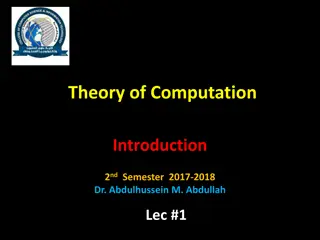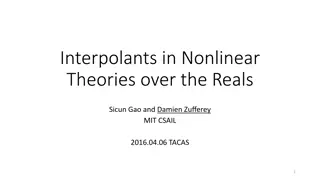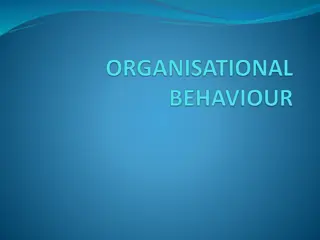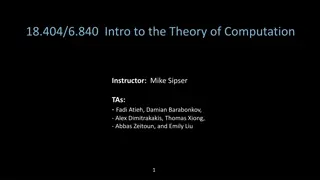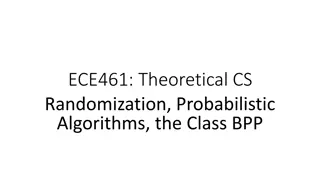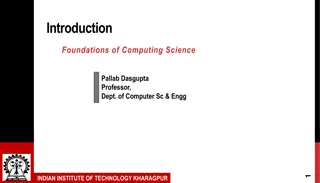Computability: Exploring Theoretical Limits of Computation
Delve into computability theory, focusing on what is computable and the limits of computation. Explore concepts like Rice's Theorem, the Halting Problem, and classes of expressiveness in computability theory, such as combinational logic, finite-state machines, pushdown automata, and Turing machines.
8 views • 43 slides
Evolution of Mathematical Theories and Proof Systems
Development of mathematical theories such as model theory, proof theory, set theory, recursion theory, and computational complexity is discussed, starting from historical perspectives with Dedekind and Peano to Godel's theorems, recursion theory's golden age in the 1930s, and advancements in proof t
4 views • 29 slides
Theory of Firms: Neoclassical vs. Modern Approaches
The theory of firms is explored through the Neoclassical and Modern perspectives. Neoclassical theory focuses on profit maximization, while Modern theory delves into managerial, principal-agent, and transaction cost theories. The discussion covers criticisms of Neoclassical theory and the essential
26 views • 79 slides
Computer Theory: From Automata to Turing Machines
Dive into the world of computer theory, exploring concepts like automata, formal languages, and Turing machines. Learn about pioneers like Alan Turing and the fundamental questions in computer science, from computability to complexity.
6 views • 44 slides
Evolution of Light Theory: From Wave Theory to Quantum Theory
At the turn of the century, the discovery of the photoelectric effect challenged the wave theory of light, leading to the development of the quantum theory by Max Planck and Albert Einstein. This new theory introduced the concept of discrete energy units known as quanta, bridging the gap between wav
8 views • 62 slides
Sizes of Infinite Sets: Insights into Countably Infinite Concepts
Explore the fascinating world of countably infinite sets through informative images and explanations from a CSE 105 lecture on the Theory of Computability. Delve into the concepts of natural numbers, strings, Turing machines, languages, and the intriguing implications of the Pigeonhole Principle. Di
3 views • 26 slides
The Halting Problem and Uncomputable Programs
The Halting Problem in computer science presents a practical uncomputable problem where determining whether a program will halt or run forever is impossible. This concept is explored through a proof by contradiction and a tricky program called Diagonal.java. The program showcases the challenges of p
3 views • 23 slides
Combinators and Computability: Unveiling the Foundations
Delve into the realm of combinatorial logic and computability through the lens of SKI combinators, exploring their Turing completeness and connection to algorithmic decision-making. Discover the historical significance of Hilbert's program, Godel's incompleteness proofs, the Church-Turing thesis, la
0 views • 65 slides
Orto-Computing: Bridging the Gap Between Formal and Phenomenological Computing
Meaningful experiments suggest a transition from the formal, Turing-based approach to a structural-phenomenological one called Orto-Computing. This innovative concept integrates mind-matter interaction and non-formal functions within computational systems, offering potential solutions to complexity
5 views • 18 slides
Undecidability in Rectangular Hybrid Automata Analysis
The undecidability of the reachability analysis in rectangular hybrid automata (RHA) poses challenges for verifying cyber-physical systems. This complexity was demonstrated through a reduction from the Halting problem of two counter machines by Henzinger et al. Additionally, the review of computabil
2 views • 15 slides
Theories of Interest in Microeconomics II
Explore various theories of interest in economics, including the Classical Theory, Liquidity Preference Theory by Keynes, Productivity Theory, Abstinence Theory, Time-Preference Theory, Fisher's Time Preference Theory, and the Loanable Fund Theory. These theories offer different perspectives on the
3 views • 6 slides
Church-Turing Thesis and Computability with Turing Machines
The Church-Turing Thesis states that every computable function can be computed by a Turing Machine. This concept, pioneered by Turing, revolutionized the way we understand computability and algorithms. By breaking down the process into primitive operations, we can express complex algorithms in an un
5 views • 21 slides
Jeff Edmonds - CSE4111/5111 Computability and Complexity Course Insights
Jeff Edmonds, a professor at York University, shares his approach to teaching CSE4111/5111 Computability and Complexity. He emphasizes the importance of collaborative learning, tough love to motivate students, and working together to tackle challenging material. His commitment to helping students su
2 views • 31 slides
Theory of Computation Introduction: Dr. Abdulhussein M. Abdullah
Delve into the theory of computation with Dr. Abdulhussein M. Abdullah in the 2nd semester of 2017-2018. Explore the fundamental questions regarding what can be computed, computational problems, and the representation of information. Gain insights into computational models and computability, complex
2 views • 27 slides
Interpolants in Nonlinear Theories: A Study in Real Numbers
Explore the application of interpolants in nonlinear theories over the real numbers, delving into topics such as reasoning about continuous formulae, Craig interpolation, and branch-and-prune strategies. Discover how nonlinear theories can be both undecidable and decidable with perturbations, captur
0 views • 20 slides
CS154 Formal Languages and Computability Thaddeus Aid Department of Computer Science San Jose State University Spring 2016
Dive into the realm of formal languages and computability with this comprehensive compilation on CS154 from the Department of Computer Science at San Jose State University. Designed for Spring 2016, this resource is licensed under Creative Commons Attribution-ShareAlike 4.0 International License.
1 views • 10 slides
Theories of Personality: Type Theory, Trait Theory, Psychoanalytic Theory
Personality theories such as Type Theory, Trait Theory, and Psychoanalytic Theory classify personality based on various factors like body build, introversion/extroversion, enduring characteristics, and unconscious forces influencing behavior.
5 views • 13 slides
The Recursion Theorem in Computability Theory
Turing machines, undecidable languages, and the power of computability theory are discussed, leading to the exploration of the Recursion Theorem in Section 6.1. Pretending extensions of TM abilities are also covered.
1 views • 9 slides
The Recursion Theorem in Computability Theory
Topics in computability theory covering Turing machines, undecidable languages, Turing-recognizable languages, and the Recursion Theorem. Exploring the boundaries of computation using theoretical models.
0 views • 21 slides
Theoretical CS: NP-Complete Problems & Cook-Levin Theorem
Computability & complexity theory, covering NP, NP-complete languages, and reductions in ECE461 course, based on textbook sections 7.4 and 7.5. Learn about hardest NP languages.
1 views • 38 slides
Theory of Computation Fall 2017 Learning Goals
This content covers learning goals for the Theory of Computation course in Fall 2017, discussing topics like time complexity, polynomial vs. exponential time, P vs. NP classes, NP-completeness, and reductions in computability and complexity theory.
0 views • 24 slides
Theory of Computation Fall 2017
Covering key concepts and themes from CSE 105, this course explores recognizable, decidable, NP, P, CF, regular languages, and models of computation. It delves into formal definitions, language design with automata, TMs, context-free languages, and more. The class roadmap includes examples on regula
0 views • 33 slides
Theory Construction in the Social Sciences: Understanding Components and Types
Explore the key components of theory construction in the social sciences, including the definition of theory, different types of theories, components of a theory, and the distinction between Big T and small t theories. Discover what theory is not and gain insights into the process of theory construc
3 views • 38 slides
Precise Points-To Analysis and Computational Complexity
Explore the correctness and precision of algorithms, Abstract Interpretation, approximating transformers, and the computability of precise solutions in pointer analysis lecture notes. Learn about the computational complexity of least-fixed point computation using collecting semantics and the challen
1 views • 25 slides
Introduction to Theory of Computation: Course Overview and Mechanics
Explore the fundamentals of computability and complexity theories with a focus on finite automata, Turing machines, P versus NP problem, and more. Dive into the role of theory in computer science, collaboration policies, and course expectations. Get ready for a comprehensive journey into the world o
13 views • 14 slides
Overview of ECE461 Theoretical Computer Science Randomization & Probabilistic Algorithms
Explore the concepts covered in ECE461, including computability theory, complexity theory, and the introduction of probabilistic Turing machines. Learn how randomization may enhance algorithm efficiency and tackle problems that are difficult to solve deterministically.
0 views • 17 slides
Foundations of Computing Science | Overview by Professor Pallab Dasgupta
Explore the foundations of computing science as discussed by Professor Pallab Dasgupta at the Indian Institute of Technology, Kharagpur. Dive into topics like discrete structures, logic, languages, automata theory, computability, computational complexity, and more. Discover recommended books for fur
11 views • 13 slides
Theory, Technology, and Education: Reflections and Challenges
Delve into the complex interplay between theory, technology, and education as discussed in a engaging seminar. Explore the nuances of theorising in social science, the significance of theory in understanding social phenomena, dimensions of theory, practical applications, and the inherent difficultie
1 views • 17 slides
Valence Bond Theory vs Molecular Orbital Theory: A Comparison
Explore the differences between Valence Bond Theory and Molecular Orbital Theory, including their postulates, strengths, and weaknesses. Valence Bond Theory, proposed by Linus Pauling, focuses on atomic orbital overlap, while Molecular Orbital Theory, introduced by Hund and Mullikan, emphasizes the
31 views • 16 slides
Turing Machines and Computability Fundamentals
Alan Turing's contributions to mathematics and computing, including the development of the Turing Machine and the concept of computability. Explore the foundation of computational theory and the implications for modern computing technology. Dive into the mechanics of the Turing Machine and its role
1 views • 63 slides
Introduction to Turing Machines and Computability
Alan Turing, a mathematician known for his groundbreaking work in statistics and code-breaking, developed the first formal definition of computation. He introduced the notion of computability by addressing the Entscheidungsproblem, which questioned the decidability of mathematical statements. Turing
4 views • 14 slides
Exploring M-Theory and Matrix Models for String Theory Enthusiasts
Delve into the intriguing world of M-Theory and Matrix Models with discussions on the different aspects including M-Theory's purpose, the Moduli Space of String Theory, Consistent String Theories, and the significance of D-branes in String Theory. Explore the mysteries and recent developments surrou
16 views • 45 slides
Understanding Computability Theory: Exploring Algorithm Solvability
Delve into Computability Theory to uncover the limitations of algorithmic solutions, focusing on decision problems and the concept of solvability through algorithms. Discover the intriguing Halting Problem and why some problems are inherently unsolvable by algorithms, regardless of time and space co
2 views • 25 slides
Understanding Time Complexity and Computability in Theory of Computation
Dive into Complexity Theory and learn about time complexity, asymptotic upper bounds, polynomial time, NP problems, and more in the field of Theory of Computation for the Spring 2025 semester at UCSD. Explore the importance of efficiently decidable problems, measuring running time, and analyzing wor
1 views • 31 slides
Leadership Theories: Trait Theory vs. Behavioural Theory
Explore the evolution of leadership theories, focusing on Trait Theory and Behavioural Theory. Trait Theory emphasizes specific traits of great leaders, while Behavioural Theory shifts focus to actions and behaviors. Learn about the strengths and weaknesses of Trait Theory in identifying universal l
1 views • 8 slides
Computation Theory: Key Concepts, Final Exam Preparation, and Next Steps
Explore essential topics in CSE 105 Theory of Computation for Spring 2025, covering recognizable, decidable, NP, P, CF, regular languages, models of computation, closure properties, and more. Enhance your understanding of formal definitions, language description, automata, and Turing Machines to exc
0 views • 33 slides
Exploring the World of Formal Languages and Computability
Dive into the realm of formal languages, computability, and theory of computation with insights from CS154 at San Jose State University. Discover the intersection of data and knowledge, the importance of imagination, and the latest in scientific breakthroughs. Engage in stimulating discussions on kn
0 views • 5 slides
Understanding Univalent Functions and Type Theory
Exploring the connection between univalent functions, homotopy theory, and type theory with a focus on Vladimir Voevodsky's program to express mathematics in type theory. Learn about the significance of homotopy theory in algebraic topology and the shift from set theory to type theory in mathematica
4 views • 22 slides
Kripke's Alleged Proof of Church-Turing Thesis
Explore the fascinating discussion around Church-Turing Thesis, with a focus on Saul Kripke's supposed proof challenging the traditional views. Delve into the historical context, recent attempts at proof, and comparisons with Church's original argument and implications for computability theory.
1 views • 19 slides
Theory of Computation Course Overview
Explore computation models, computability, and complexity in the Theory of Computation course taught by Instructor Kai Cai. Delve into finite automata, Turing machines, decidable and undecidable problems, P vs. NP complexity, and the Clay Mathematics Institute's $1M Millennium Prize Problem. Develop
1 views • 9 slides
